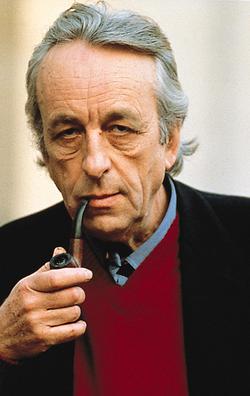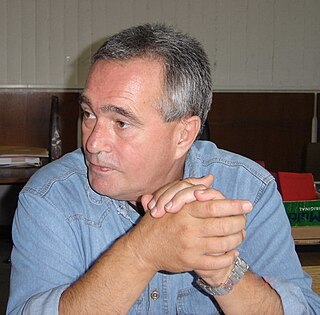
Louis Pierre Althusser was a French Marxist philosopher who studied at the École normale supérieure in Paris, where he eventually became Professor of Philosophy.
Modernity, a topic in the humanities and social sciences, is both a historical period and the ensemble of particular socio-cultural norms, attitudes and practices that arose in the wake of the Renaissance—in the Age of Reason of 17th-century thought and the 18th-century Enlightenment. Some commentators consider the era of modernity to have ended by 1930, with World War II in 1945, or the 1980s or 1990s; the following era is called postmodernity. The term "contemporary history" is also used to refer to the post-1945 timeframe, without assigning it to either the modern or postmodern era.
In the 19th century, the philosophers of the 18th-century Enlightenment began to have a dramatic effect on subsequent developments in philosophy. In particular, the works of Immanuel Kant gave rise to a new generation of German philosophers and began to see wider recognition internationally. Also, in a reaction to the Enlightenment, a movement called Romanticism began to develop towards the end of the 18th century. Key ideas that sparked changes in philosophy were the fast progress of science, including evolution, most notably postulated by Charles Darwin and Jean-Baptiste Lamarck, and theories regarding what is today called emergent order, such as the free market of Adam Smith within nation states, or the Marxist approach concerning class warfare between the ruling class and the working class developed by Karl Marx and Friedrich Engels. Pressures for egalitarianism, and more rapid change culminated in a period of revolution and turbulence that would see philosophy change as well.

Conflict theories are perspectives in political philosophy and sociology which argue that individuals and groups within society interact on the basis of conflict rather than agreement, while also emphasizing social psychology, historical materialism, power dynamics, and their roles in creating power structures, social movements, and social arrangements within a society. Conflict theories often draw attention to power differentials, such as class conflict, or a conflict continuum. Power generally contrasts historically dominant ideologies, economies, currencies or technologies. Accordingly, conflict theories represent attempts at the macro-level analysis of society.

Prem Pal Singh Rawat, formerly known as Maharaji, is an Indian international speaker and author. His teachings include a meditation practice he calls "Knowledge", and peace education based on the discovery of personal resources such as inner strength, choice, appreciation and hope.

Sociology as a scholarly discipline emerged, primarily out of Enlightenment thought, as a positivist science of society shortly after the French Revolution. Its genesis owed to various key movements in the philosophy of science and the philosophy of knowledge, arising in reaction to such issues as modernity, capitalism, urbanization, rationalization, secularization, colonization and imperialism.
Marxism is a political philosophy and method of socioeconomic analysis that uses a materialist interpretation of historical development, better known as historical materialism, to understand class relations and social conflict and a dialectical perspective to view social transformation. It originates from the works of 19th-century German philosophers Karl Marx and Friedrich Engels. As Marxism has developed over time into various branches and schools of thought, no single, definitive Marxist theory exists. Marxism has had a profound impact in shaping the modern world, with various left-wing and far-left political movements taking inspiration from it in varying local contexts.
There are varying interpretations of Max Weber's liberalism due to his well-known sociological achievements. Max Weber is considered an eminent founder of modern social sciences, rivaled by the figures of Émile Durkheim and Karl Marx. Some students of Weberian thought have paid less attention to Weber's extensive and often passionate engagement with the politics of his day, particularly in the United States. However, European intellectuals have given more attention to his political thought. Most of Weber's political writings have not been published in translation, or have been translated only recently in a piecemeal form.

The environmental humanities is an interdisciplinary area of research, drawing on the many environmental sub-disciplines that have emerged in the humanities over the past several decades, in particular environmental literature, environmental philosophy, environmental history, science and technology studies, environmental anthropology, and environmental communication. Environmental humanities employs humanistic questions about meaning, culture, values, ethics, and responsibilities to address pressing environmental problems. The environmental humanities aim to help bridge traditional divides between the sciences and the humanities, as well as between Western, Eastern, and Indigenous ways of relating to the natural world and the place of humans within it. The field also resists the traditional divide between "nature" and "culture," showing how many "environmental" issues have always been entangled in human questions of justice, labor, and politics. Environmental humanities is also a way of synthesizing methods from different fields to create new ways of thinking through environmental problems.
George E. McCarthy is a professor of sociology at Kenyon College in Gambier, Ohio, USA.

Ron Scapp is a noted American educator and author. His work focuses on urban education, educational leadership and policy, and teacher empowerment. He also writes on topics as varied as homelessness, American theater and continental philosophy.

Sacred Journeys: The Conversion of Young Americans to Divine Light Mission is a sociological book about the adherents of the Divine Light Mission in the 1970s. In the work, author James V. Downton, Jr. analyzes a sample group of young Americans, and their conversion process to the ideals of the Divine Light Mission and their relationship with Guru Maharaj Ji, currently known as Prem Rawat.
Bibliography of Prem Rawat and related organizations lists bibliographical material regarding Prem Rawat and organizations like Divine Light Mission, Elan Vital and the Prem Rawat Foundation.

Mark Olssen, FAcSS, a political theorist, is Emeritus Professor of Political Theory and Education Policy in the Department of Politics within the Faculty of Social Sciences at the University of Surrey.
Thomas J. Scheff is an American Professor, Emeritus, Department of Sociology at University of California, Santa Barbara. His fields of study are the emotional/relational world, mental illness, restorative justice, and collective violence. He holds a BS from the University of Arizona in Physics (1950), and a PhD in sociology from the University of California (Berkeley) (1960). He was at University of Wisconsin from 1959–63, when he joined the faculty at the University of California, Santa Barbara.

Marxist sociology refers to the application of Marxist perspective within the study of sociology. Marxism itself can be recognized as both a political philosophy and a sociological method, insofar as it attempts to remain scientific, systematic, and objective rather than purely normative and prescriptive. Hence, Marxist sociology is "a form of conflict theory associated with…Marxism's objective of developing a positive (empirical) science of capitalist society as part of the mobilization of a revolutionary working class."

Ljubomir Cuculovski is a Macedonian philosopher and professor in Skopje. He graduated from the Department of Philosophy, Faculty of Philosophy of Ss. Cyril and Methodius University of Skopje, with a thesis on The Sources of Bergson’s Theory of Knowledge. Then he received his master's title in sociological science in 1982, at the Institute for Sociological, Political and Juridical Research in Skopje, with a thesis on Religion and Morality. He received his PhD in philosophical sciences from the Faculty of Philosophy in Skopje in 1992, with a dissertation on Karl Marx: The Origin of Historical Materialism (1841–1849).
Charisma is a personal quality of presence or charm that others find compelling. In Christian theology, the term appears as charism, an endowment or extraordinary power given by the Holy Spirit. Scholars in sociology, political science, psychology, and management reserve the term for a type of leadership seen as extraordinary.

Nicholas C. Burbules is a Gutgsell Endowed Professor of Education Policy, Organization and Leadership and an affiliate of the Unit for Criticism and Interpretative Theory at the University of Illinois at Urbana-Champaign. He is the director of the Ubiquitous Learning Institute and has served as Editor of the journal Educational Theory since 1991.
Andelko Milardović is a Croatian political scientist, sociologist and college professor, also a scientific researcher of the Institute for Migration and Ethnic Studies in Zagreb. He is the founder and director of the Centre for Political Researches and more recently "Think Thank" Institute of European and globalization studies.









